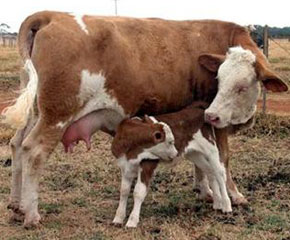“Extensive evaluation of the available data has not identified any subtle hazards that might indicate food consumption risks in healthy clones of cattle, swine or goats,” the Food and Drug Administration said in a final risk assessment.
The FDA, after reviewing more than 700 studies, said it did not have enough facts to make an assertion about cloned sheep.
The ruling was the latest twist after years of debate over the reproductive technology, which advocates say will provide consumers with top-quality food by replicating prized animals that can breed highly productive offspring.
The cloning industry, made up so far of only a handful of firms, expects that it will be the offspring of cloned animals, not the costly clones themselves, that would provide meat or milk to US consumers.
There are currently about 570 cloned animals in the United States, but the livestock industry has so far followed a voluntary ban on marketing food from cloned animals.
While the FDA findings are a boon for the cloning industry, the topic remains controversial even among food producers and is an unpalatable idea for many American consumers.
Caution among lawmakers, producers
Others in Congress and civil society believe more testing is needed before concluding that cloning is safe, especially with consumer confidence marred by recent food scares.
“The cloning industry’s proposal is simply another attempt to force cloned milk and meat on consumers and the dairy industry by giving the public phony assurances,” the Centre for Food Safety, an advocacy group, said in a statement.
The FDA will not require mandatory labels for clone-derived food and will review “clone-free” labels individually. The FDA notes that the ethical and moral implications of cloning fall outside the scope of its findings. Critics, like the US Humane Society, say cloned animals born with defects or prone to disease are proof the technology is a bad idea.
US cloning firms, including Texas-based ViaGen Inc, believe the sale of cloned animals, which can cost upwards of $13 000 each, will grow slowly in coming years. The FDA cloning decision comes as biotechnology becomes an ever more important part of global agriculture.
Just last week, the European Food Safety Authority made an interim ruling about food from cloned animals and their offspring, saying it was unlikely there was any difference from food derived from traditionally bred animals.
Will you eat meat from a cloned animal?

